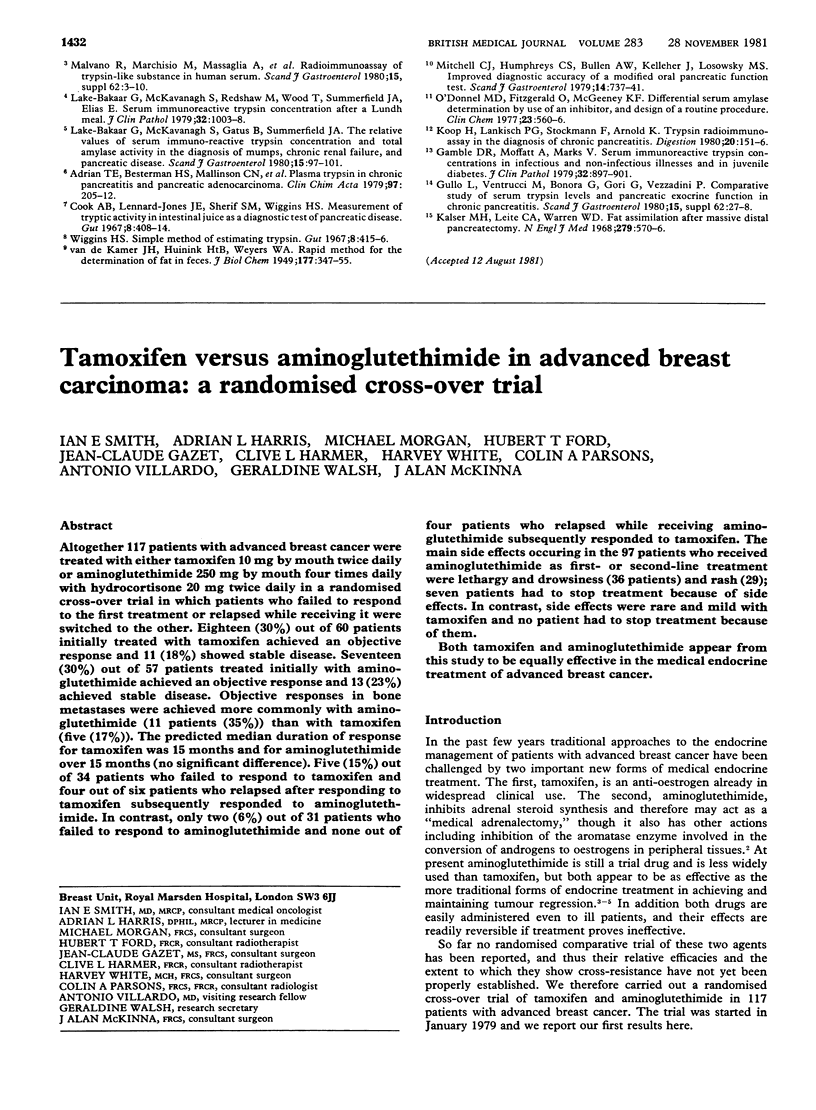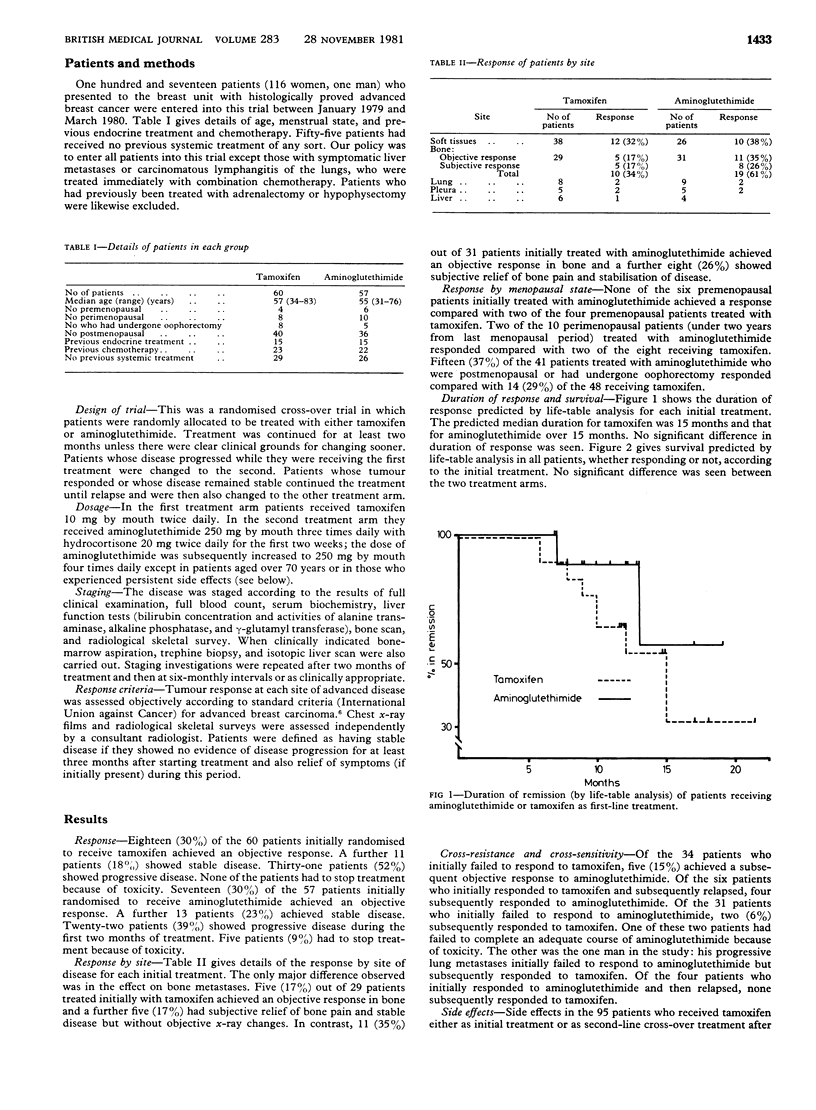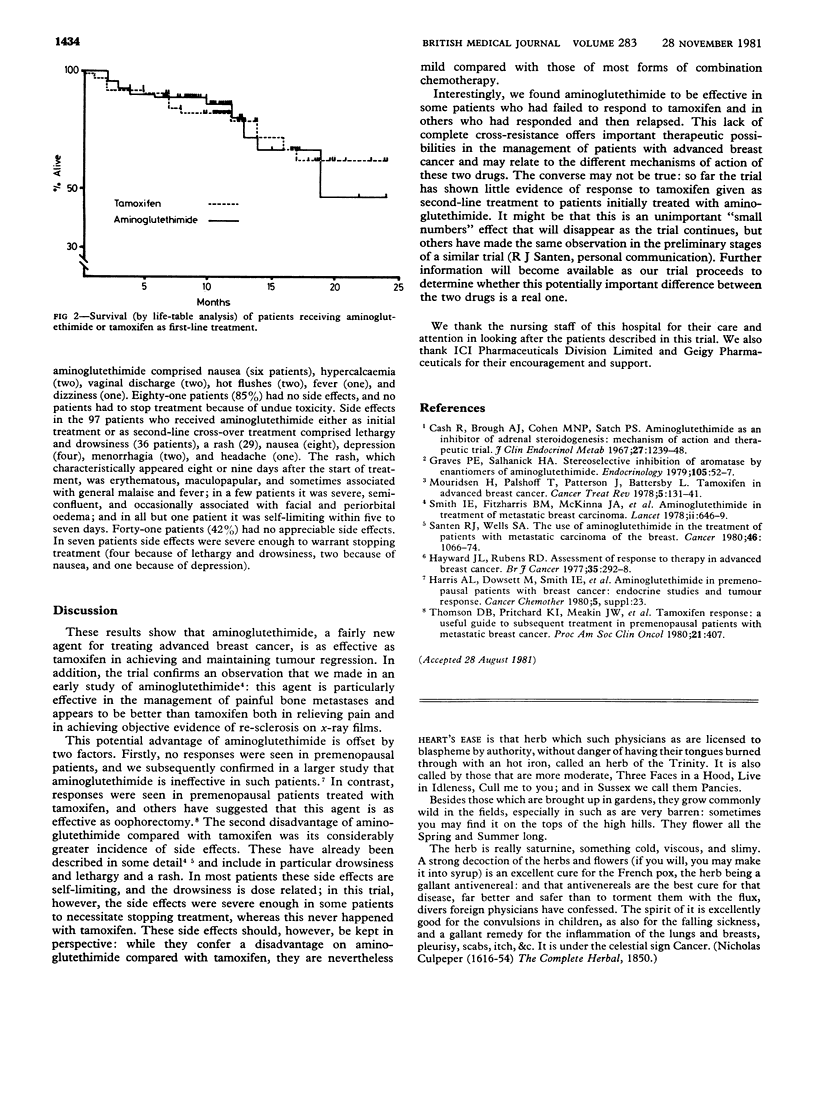Abstract
Altogether 117 patients with advanced breast cancer were treated with either tamoxifen 10 mg by mouth twice daily or aminoglutethimide 250 mg by mouth four times daily with hydrocortisone 20 mg twice daily in a randomised cross-over trial in which patients who failed to respond to the first treatment or relapsed while receiving it were switched to the other. Eighteen (30%) out of 60 patients initially treated with tamoxifen achieved an objective response and 11 (18%) showed stable disease. Seventeen (30%) out of 57 patients treated initially with aminoglutethimide achieved an objective response and 13 (23%) achieved stable disease. Objective responses in bone metastases were achieved more commonly with aminoglutethimide (11 patients (35%)) than with tamoxifen (five (17%)). The predicted median duration of response for tamoxifen was 15 months and for aminoglutethimide over 15 months (no significant difference). Five (15%) out of 34 patients who failed to respond to tamoxifen and four out of six patients who relapsed after responding to tamoxifen subsequently responded to aminoglutethimide. In contrast, only two (6%) out of 31 patients who failed to respond to aminoglutethimide and none out of four patients who relapsed while receiving aminoglutethimide subsequently responded to tamoxifen. The main side effects occurring in the 97 patients who received aminoglutethimide as first- or second-line treatment were lethargy and drowsiness (36 patients) and rash (29); seven patients had to stop treatment because of side effects. In contrast, side effects were rare and mild with tamoxifen and no patient had to stop treatment because of them. Both tamoxifen and aminoglutethimide appeared from this study to be equally effective in the medical endocrine treatment of advanced breast cancer.
Full text
PDF


Selected References
These references are in PubMed. This may not be the complete list of references from this article.
- Cash R., Brough A. J., Cohen M. N., Satoh P. S. Aminoglutethimide (Elipten-Ciba) as an inhibitor of adrenal steroidogenesis: mechanism of action and therapeutic trial. J Clin Endocrinol Metab. 1967 Sep;27(9):1239–1248. doi: 10.1210/jcem-27-9-1239. [DOI] [PubMed] [Google Scholar]
- Graves P. E., Salhanick H. A. Stereoselective inhibition of aromatase by enantiomers of aminoglutethimide. Endocrinology. 1979 Jul;105(1):52–57. doi: 10.1210/endo-105-1-52. [DOI] [PubMed] [Google Scholar]
- Hayward J. L., Carbone P. P., Heusen J. C., Kumaoka S., Segaloff A., Rubens R. D. Assessment of response to therapy in advanced breast cancer. Br J Cancer. 1977 Mar;35(3):292–298. doi: 10.1038/bjc.1977.42. [DOI] [PMC free article] [PubMed] [Google Scholar]
- Mouridsen H., Palshof T., Patterson J., Battersby L. Tamoxifen in advanced breast cancer. Cancer Treat Rev. 1978 Sep;5(3):131–141. doi: 10.1016/s0305-7372(78)80017-6. [DOI] [PubMed] [Google Scholar]
- Santen R. J., Wells S. A., Jr The use of aminoglutethimide in the treatment of patients with metastatic carcinoma of the breast. Cancer. 1980 Aug 15;46(4 Suppl):1066–1074. doi: 10.1002/1097-0142(19800815)46:4+<1066::aid-cncr2820461335>3.0.co;2-m. [DOI] [PubMed] [Google Scholar]
- Smith I. E., Fitzharris B. M., McKinna J. A., Fahmy D. R., Nash A. G., Neville A. M., Gazet J. C., Ford H. T., Powles T. J. Aminoglutethimide in treatment of metastatic breast carcinoma. Lancet. 1978 Sep 23;2(8091):646–649. doi: 10.1016/s0140-6736(78)92759-9. [DOI] [PubMed] [Google Scholar]


